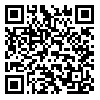Wed, Jul 16, 2025
| فارسی
Volume 17, Issue 1 (Spring 2015)
Advances in Cognitive Sciences 2015, 17(1): 35-45 |
Back to browse issues page
Download citation:
BibTeX | RIS | EndNote | Medlars | ProCite | Reference Manager | RefWorks
Send citation to:



BibTeX | RIS | EndNote | Medlars | ProCite | Reference Manager | RefWorks
Send citation to:
Dastlan M, Mohammadebrahimi Z, Mehdibeyraghdar R, Rovshan B. Tense in Persian Language; a New Perspective Based on an Idealized Cognitive Model. Advances in Cognitive Sciences 2015; 17 (1) :35-45
URL: http://icssjournal.ir/article-1-317-en.html
URL: http://icssjournal.ir/article-1-317-en.html
1- Ph.D. student, General Linguistics. Linguistics department, Payamenoor University,Iran.
2- Assistant Professor, Linguistics department, Shahidbeheshti University,Tehran,Iran.
3- Assistant Professor, Linguistics department, Payamenoor University,Tehran,Iran.
4- Associate Professor, Linguistics department, Payamenoor University,Iran.
2- Assistant Professor, Linguistics department, Shahidbeheshti University,Tehran,Iran.
3- Assistant Professor, Linguistics department, Payamenoor University,Tehran,Iran.
4- Associate Professor, Linguistics department, Payamenoor University,Iran.
Abstract: (3145 Views)
Introduction: Temporal experience is an absolutely abstract and internal perception. Unlike space experience, it cannot be perceived by any of our sensory modalities, while it is a real and common experience. This study proposes a new perspective on conceptualization of tenses in Persian language through cognitive linguistics perspectives and based on an idealized cognitive model.
Method: To this end, first we turned to a thorough consideration of the concept of time from philosophical and typological points of view. Then, the idealized cognitive model of time was introduced and thoroughly investigated.
Results: According to the Langacker’s theory on the new division of verb phrases, we came to the conclusion that Persian verb phrases are also divided into grounding predication and clausal head and these are the grounding predications that bear the notion of tense in Persian language clauses. The morphemes which stand for grounding predications in past, present and future tenses were determined and located in our idealized cognitive model. Conclusion: The grounding predications were found to be in complete alignment with the component parts of the idealized cognitive model.
Method: To this end, first we turned to a thorough consideration of the concept of time from philosophical and typological points of view. Then, the idealized cognitive model of time was introduced and thoroughly investigated.
Results: According to the Langacker’s theory on the new division of verb phrases, we came to the conclusion that Persian verb phrases are also divided into grounding predication and clausal head and these are the grounding predications that bear the notion of tense in Persian language clauses. The morphemes which stand for grounding predications in past, present and future tenses were determined and located in our idealized cognitive model. Conclusion: The grounding predications were found to be in complete alignment with the component parts of the idealized cognitive model.
Subject:
Special
Received: 2014/11/19 | Accepted: 2015/01/18 | Published: 2015/03/21
Received: 2014/11/19 | Accepted: 2015/01/18 | Published: 2015/03/21
Send email to the article author
| Rights and permissions | |
 |
This work is licensed under a Creative Commons Attribution-NonCommercial 4.0 International License. |



